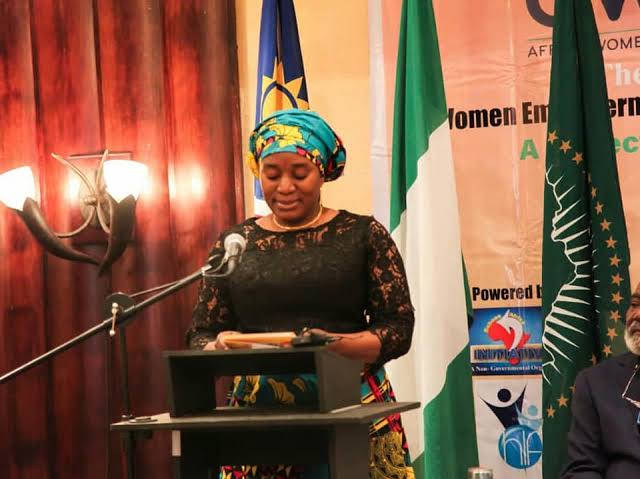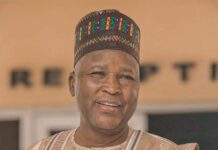African Women and the Lusaka Declaration
By Dr. Jumai Ahmadu
Africa must help itself by deliberately charting the course for women development as their women struggle to participate effectively in the affairs of their societies.
They lack skills or education to be able to access economic opportunities. Social, psychological, physical and economic implications continue to haunt them. It is for this reason that we have persistently latched onto the need for new technology in our advocacy for the betterment of the African woman.
Therefore, in order to push for the consolidation of the growth, stability and development of African women, the African Women Conference (AWC) has in the last few years been exploring ways to fully connect our women to technological innovations for their socioeconomic growth.
Born out of the desire to ensure that the rich human resources and potentials of African women and girls is channelled towards the sustainable development of the continent, the Africa Women Conference (AWC) is convened by Helpline Foundation for the Needy, an NGO in ECOSOC Consultative Status with the United Nations and Echoes Africa Initiatives, New York.
The annual AWC is an important annual gatherings of experts, institutions, corporate organizations and individuals promoting the growth, stability and development of African women.
Profitable partnerships, collaborations and policy advocates are being created through the continuous engagements among members from year to year.
The aim of the conference is to set agendas and viable options through which stake holders in the African polity can channel the various resources available to African women towards the sustainable development of the continent.
This was the focus during the 8th edition of the Africa Women Conference (AWC 2024) that held in Lusaka, Zambia November 6-8, 2024.
This year, the inspiring theme: Digital Advancement: Harnessing its Potential for the African Woman, provided a vital platform for collaboration, learning, and sharing innovative ideas in this new digital age, and recognised the incredible opportunities it presents for African women to empower ourselves and our communities.
The sub themes were “Empowering Women in Technology to Foster Digital Inclusion, Leadership, and Innovation. Harnessing Technology for Women Entrepreneurs to Drive Inter-African Trade and Economic Empowerment”.
Digital technologies are unlocking new opportunities for rapid economic growth, innovation, job creation and access to services everywhere in the world.
The 3-day confab explored the many dimensions of digital advancement: entrepreneurship, education, health, and social advocacy, aiming to break barriers and envision a future where African women lead in decision-making and innovation.
This will broaden their knowledge and provide them with practical skills to become more confident and efficient as they lead women in their respective communities.
Nigeria’s Minister of Women Affairs, Imaan Suleiman-Ibrahim, represented by Princess Jummai Idonije, in her speech at the conference, charged participants to come up with recommendations that can improve African Women’s participation in the African Continental Free Trade Agreement (AfCFTA).
She said that by leveraging AfCFTA, African women can unlock new economic opportunities, enhance their participation in trade, and contribute to the continent’s growth and development.
The conference featured three panel sessions and a breakout session and identified some of the following challenges:
Read Also:
Digital Inclusion in Education:
i. Infrastructure limitations, including unreliable electricity and poor internet connectivity.
ii. Excessive costs associated with digital access and low digital literacy rates.
Health and Women Safety:
i. Cultural and religious beliefs restrict women’s access to healthcare and mental health support.
Digital Media and Gender Equality:
i. Lack of representation for marginalised communities in digital media.
ii. Limited resources and collaboration to support marginalised voices.
Afro Markets and Economic Empowerment aka African Women Market Project
i. Limited market access and resources for African women entrepreneurs
ii. Barriers to business literacy and digital trade due to high transaction costs.
The conference therefore proposed the following solutions:
Promote digital inclusion and equality, focusing on rural women and girls, host digital literacy workshops and create mentorship programs, advocate for policies supporting digital access and economic empowerment for women.
It also called for knowledge sharing by highlighting successful digital inclusion initiatives and share best practices and the setting up of digital hubs (community ICT centres) in rural areas to improve access to education and resources.
Funding and partnerships is also important as resource mobilisation is crucial for sustainable digital inclusion initiatives, and also recommended use cloud-based solutions, localised content, and mobile optimisation to reach a broader audience.
AWC also called for the establishment of government and private initiatives to enhance digital literacy among women, and encouraged banks to offer micro loans without collateral and support flexible repayment terms.
The conference also called for the development of mentorship and recruitment initiatives for women in leadership roles within the financial sectors, and the forming of public-private partnerships to provide mentorship, grants, and venture capital for women-led businesses.
African women should engage in continuous awareness campaigns to challenge harmful beliefs and encourage women to seek support, educate young girls on data privacy, encourage medical studies among young women, and train them to be self-sufficient.
They should also promote gender sensitivity from an early age and encourage community-based training programs, and develop a storytelling platform offering various media formats to amplify diverse voices.
Also, women should conduct digital literacy programmes and foster mentor-mentee relationships, work with local organisations and influencers to expand reach and provide resources and training for community members on essential skills like grant writing.
They should also create a multi-platform digital solution with podcast distribution, social media integration, and user support for long-term engagement and sustainability.
These resolutions reflect AWC’s commitment to addressing digital inclusion, financial empowerment, educational access, and economic independence for African women.
Each proposal is aligned with sustainable development goals, focusing on inclusivity, gender equality, and capacity building.
Continuous collaboration, advocacy, and partnerships are recommended for effective implementation and scalability.
In the pursuit of excellence let us continue to support one another, amplify each other’s voices, and create opportunities for the next generation through mentoring, partnerships and collaboration.
Dr. Jumai Ahmadu, Co-Convener, African Women Conference, Lusaka, Zambia















